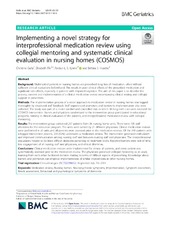| dc.contributor.author | Gulla, Christine | en_US |
| dc.contributor.author | Flo, Elisabeth | en_US |
| dc.contributor.author | Kjome, Reidun Lisbet Skeide | en_US |
| dc.contributor.author | Husebø, Bettina | en_US |
| dc.date.accessioned | 2020-08-10T13:19:25Z | |
| dc.date.available | 2020-08-10T13:19:25Z | |
| dc.date.issued | 2019-05-07 | |
| dc.Published | Gulla C, Flo E, Kjome RLS, Husebo B. Implementing a novel strategy for interprofessional medication review using collegial mentoring and systematic clinical evaluation in nursing homes (COSMOS). BMC Geriatrics. 2019;19:130 | eng |
| dc.identifier.issn | 1471-2318 | |
| dc.identifier.uri | https://hdl.handle.net/1956/23624 | |
| dc.description.abstract | Background: Multimorbid patients in nursing homes are prescribed long lists of medication, often without sufficient clinical evaluations beforehand. This results in poor clinical effects of the prescribed medication and significant side-effects, especially in patients with impaired cognition. The aim of this paper is to describe the process, content and implementation of a clinical medication review encompassing clinical testing and collegial support to prescribers. Methods: The implementation process of a novel approach to medication review in nursing homes was logged thoroughly by structured staff feedback. Staff experienced promotors and barriers to implementation also were collected. The study was part of a cluster randomized controlled trial, in which 36 long-term care units received the COSMOS intervention. Nurses and physicians randomized to the intervention group participated in educational programs, training in clinical evaluation of the patients, and interprofessional medication review with collegial mentoring. Results: The intervention group contained 297 patients from 36 nursing home units. There were 105 staff attendees for the education program. The units were served by 21 different physicians. Clinical medication reviews were performed in all units and all patients were assessed prior to the medication reviews. Of the 240 patients with a logged intervention process, 220 (92%) underwent a medication review. The intervention generated enthusiasm and improved communication among nursing staff and between nursing staff and physicians. The interprofessional discussions helped to facilitate difficult decisions pertaining to treatment levels. Reported barriers were lack of time, low engagement of all nursing staff and physicians, and ethical dilemmas. Conclusions: Clinical medication reviews were implemented for almost all patients, and every patient was systematically assessed prior to the medication review. The physicians perceived collegial mentoring as an asset, learning from each other facilitated decision making in terms of difficult aspects of prescribing. Knowledge about barriers and promotors can improve implementation of similar interventions in other nursing homes. | en_US |
| dc.language.iso | eng | eng |
| dc.publisher | BioMed Central | eng |
| dc.rights | Attribution CC BY | eng |
| dc.rights.uri | http://creativecommons.org/licenses/by/4.0/ | eng |
| dc.title | Implementing a novel strategy for interprofessional medication review using collegial mentoring and systematic clinical evaluation in nursing homes (COSMOS) | en_US |
| dc.type | Peer reviewed | |
| dc.type | Journal article | |
| dc.date.updated | 2020-01-27T16:16:55Z | |
| dc.description.version | publishedVersion | en_US |
| dc.rights.holder | Copyright 2019 The Authors | |
| dc.identifier.doi | https://doi.org/10.1186/s12877-019-1139-6 | |
| dc.identifier.cristin | 1714629 | |
| dc.source.journal | BMC Geriatrics | |

